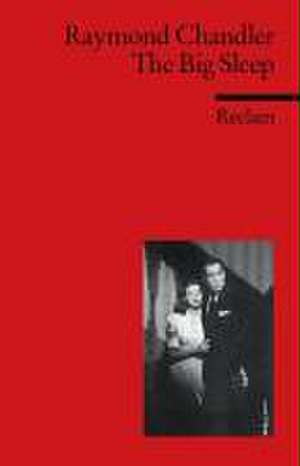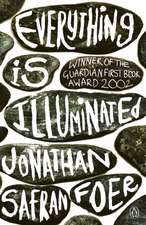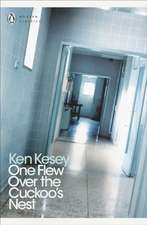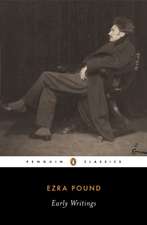The Big Sleep: Reclam Universal-Bibliothek, cartea 9009
Editat de Bernd Neumeyer, Klaus Degering Autor Raymond Chandleren Limba Engleză Paperback – dec 1994
| Toate formatele și edițiile | Preț | Express |
|---|---|---|
| Paperback (6) | 46.95 lei 22-33 zile | +15.67 lei 6-12 zile |
| Penguin Books – 13 aug 2014 | 46.95 lei 22-33 zile | +15.67 lei 6-12 zile |
| Penguin Books – 14 iun 2011 | 52.74 lei 22-33 zile | +18.40 lei 6-12 zile |
| Vintage Books USA – 31 mai 2002 | 91.00 lei 3-5 săpt. | +25.63 lei 6-12 zile |
| Important Books – 7 iul 2013 | 67.43 lei 39-44 zile | |
| Indoeuropeanpublishing.com – 31 mai 2011 | 81.13 lei 6-8 săpt. | |
| Bibliotech Press – 29 iul 2018 | 102.15 lei 6-8 săpt. | |
| Hardback (2) | 192.60 lei 6-8 săpt. | |
| Indoeuropeanpublishing.com – iul 2018 | 192.60 lei 6-8 săpt. | |
| Bibliotech Press – 29 iul 2018 | 192.60 lei 6-8 săpt. |
Din seria Reclam Universal-Bibliothek
-
 Preț: 39.42 lei
Preț: 39.42 lei -
 Preț: 46.47 lei
Preț: 46.47 lei -
 Preț: 30.69 lei
Preț: 30.69 lei -
 Preț: 30.21 lei
Preț: 30.21 lei -
 Preț: 46.59 lei
Preț: 46.59 lei -
 Preț: 41.11 lei
Preț: 41.11 lei -
 Preț: 42.23 lei
Preț: 42.23 lei -
 Preț: 37.83 lei
Preț: 37.83 lei -
 Preț: 153.50 lei
Preț: 153.50 lei -
 Preț: 41.67 lei
Preț: 41.67 lei -
 Preț: 39.74 lei
Preț: 39.74 lei -
 Preț: 39.81 lei
Preț: 39.81 lei -
 Preț: 39.07 lei
Preț: 39.07 lei -
 Preț: 49.35 lei
Preț: 49.35 lei -
 Preț: 40.60 lei
Preț: 40.60 lei -
 Preț: 55.06 lei
Preț: 55.06 lei -
 Preț: 41.59 lei
Preț: 41.59 lei -
 Preț: 44.42 lei
Preț: 44.42 lei -
 Preț: 39.07 lei
Preț: 39.07 lei -
 Preț: 44.08 lei
Preț: 44.08 lei -
 Preț: 41.72 lei
Preț: 41.72 lei -
 Preț: 44.48 lei
Preț: 44.48 lei -
 Preț: 36.53 lei
Preț: 36.53 lei -
 Preț: 35.72 lei
Preț: 35.72 lei -
 Preț: 47.24 lei
Preț: 47.24 lei -
 Preț: 65.76 lei
Preț: 65.76 lei -
 Preț: 48.07 lei
Preț: 48.07 lei -
 Preț: 25.77 lei
Preț: 25.77 lei -
 Preț: 27.91 lei
Preț: 27.91 lei -
 Preț: 45.52 lei
Preț: 45.52 lei -
 Preț: 39.45 lei
Preț: 39.45 lei -
 Preț: 36.87 lei
Preț: 36.87 lei -
 Preț: 40.89 lei
Preț: 40.89 lei -
 Preț: 41.11 lei
Preț: 41.11 lei -
 Preț: 40.56 lei
Preț: 40.56 lei -
 Preț: 43.93 lei
Preț: 43.93 lei -
 Preț: 42.86 lei
Preț: 42.86 lei -
 Preț: 60.04 lei
Preț: 60.04 lei -
 Preț: 45.95 lei
Preț: 45.95 lei -
 Preț: 40.81 lei
Preț: 40.81 lei -
 Preț: 32.03 lei
Preț: 32.03 lei -
 Preț: 58.62 lei
Preț: 58.62 lei -
 Preț: 31.14 lei
Preț: 31.14 lei -
 Preț: 38.16 lei
Preț: 38.16 lei -
 Preț: 21.68 lei
Preț: 21.68 lei -
 Preț: 35.66 lei
Preț: 35.66 lei -
 Preț: 45.38 lei
Preț: 45.38 lei -
 Preț: 39.13 lei
Preț: 39.13 lei -
 Preț: 42.93 lei
Preț: 42.93 lei -
 Preț: 46.08 lei
Preț: 46.08 lei
Preț: 52.54 lei
Nou
Puncte Express: 79
Preț estimativ în valută:
10.05€ • 10.75$ • 8.38£
10.05€ • 10.75$ • 8.38£
Carte indisponibilă temporar
Doresc să fiu notificat când acest titlu va fi disponibil:
Se trimite...
Preluare comenzi: 021 569.72.76
Specificații
ISBN-13: 9783150090091
ISBN-10: 3150090091
Pagini: 379
Dimensiuni: 98 x 148 x 20 mm
Greutate: 0.16 kg
Editura: Reclam Philipp Jun.
Seriile Reclam Universal-Bibliothek, Fremdsprachentexte
ISBN-10: 3150090091
Pagini: 379
Dimensiuni: 98 x 148 x 20 mm
Greutate: 0.16 kg
Editura: Reclam Philipp Jun.
Seriile Reclam Universal-Bibliothek, Fremdsprachentexte
Notă biografică
Raymond Thornton Chandler (1888 - 1959) was the master practitioner of American hard-boiled crime fiction. Although he was born in Chicago, Chandler spent most of his boyhood and youth in England where he attended Dulwich College and later worked as a freelance journalist for The Westminster Gazette and The Spectator. During World War I, Chandler served in France with the First Division of the Canadian Expeditionary Force, transferring later to the Royal Flying Corps (R. A. F.). In 1919 he returned to the United States, settling in California, where he eventually became director of a number of independent oil companies. The Depression put an end to his career, and in 1933, at the age of forty-five, he turned to writing fiction, publishing his first stories in Black Mask. Chandler’s detective stories often starred the brash but honorable Philip Marlowe (introduced in 1939 in his first novel, The Big Sleep) and were noted for their literate presentation and dead-on critical eye. Never a prolific writer, Chandler published only one collection of stories and seven novels in his lifetime. Some of Chandler’s novels, like The Big Sleep, were made into classic movies which helped define the film noir style. In the last year of his life he was elected president of the Mystery Writers of America. He died in La Jolla, California on March 26, 1959.
Recenzii
"Raymond Chandler is a master." --The New York Times
“[Chandler] wrote as if pain hurt and life mattered.” --The New Yorker
“Chandler seems to have created the culminating American hero: wised up, hopeful, thoughtful, adventurous, sentimental, cynical and rebellious.” --Robert B. Parker, The New York Times Book Review
“Philip Marlowe remains the quintessential urban private eye.” --Los Angeles Times
“Nobody can write like Chandler on his home turf, not even Faulkner. . . . An original. . . . A great artist.” —The Boston Book Review
“Raymond Chandler was one of the finest prose writers of the twentieth century. . . . Age does not wither Chandler’s prose. . . . He wrote like an angel.” --Literary Review
“[T]he prose rises to heights of unselfconscious eloquence, and we realize with a jolt of excitement that we are in the presence of not a mere action tale teller, but a stylist, a writer with a vision.” --Joyce Carol Oates, The New York Review of Books
“Chandler wrote like a slumming angel and invested the sun-blinded streets of Los Angeles with a romantic presence.” —Ross Macdonald
“Raymond Chandler is a star of the first magnitude.” --Erle Stanley Gardner
“Raymond Chandler invented a new way of talking about America, and America has never looked the same to us since.” --Paul Auster
“[Chandler]’s the perfect novelist for our times. He takes us into a different world, a world that’s like ours, but isn’t. ” --Carolyn See
“[Chandler] wrote as if pain hurt and life mattered.” --The New Yorker
“Chandler seems to have created the culminating American hero: wised up, hopeful, thoughtful, adventurous, sentimental, cynical and rebellious.” --Robert B. Parker, The New York Times Book Review
“Philip Marlowe remains the quintessential urban private eye.” --Los Angeles Times
“Nobody can write like Chandler on his home turf, not even Faulkner. . . . An original. . . . A great artist.” —The Boston Book Review
“Raymond Chandler was one of the finest prose writers of the twentieth century. . . . Age does not wither Chandler’s prose. . . . He wrote like an angel.” --Literary Review
“[T]he prose rises to heights of unselfconscious eloquence, and we realize with a jolt of excitement that we are in the presence of not a mere action tale teller, but a stylist, a writer with a vision.” --Joyce Carol Oates, The New York Review of Books
“Chandler wrote like a slumming angel and invested the sun-blinded streets of Los Angeles with a romantic presence.” —Ross Macdonald
“Raymond Chandler is a star of the first magnitude.” --Erle Stanley Gardner
“Raymond Chandler invented a new way of talking about America, and America has never looked the same to us since.” --Paul Auster
“[Chandler]’s the perfect novelist for our times. He takes us into a different world, a world that’s like ours, but isn’t. ” --Carolyn See
Extras
ONE
It was about eleven o'clock in the morning, mid October, with the sun not shining and a look of hard wet rain in the clearness of the foothills. I was wearing my powder-blue suit, with dark blue shirt, tie and display handkerchief, black brogues, black wool socks with dark blue clocks on them. I was neat, clean, shaved and sober, and I didn't care who knew it. I was everything the well-dressed private detective ought to be. I was calling on four million dollars.
The main hallway of the Sternwood place was two stories high. Over the entrance doors, which would have let in a troop of Indian elephants, there was a broad stained-glass panel showing a knight in dark armor rescuing a lady who was tied to a tree and didn't have any clothes on but some very long and convenient hair. The knight had pushed the vizor of his helmet back to be sociable, and he was fiddling with the knots on the ropes that tied the lady to the tree and not getting anywhere. I stood there and thought that if I lived in the house, I would sooner or later have to climb up there and help him. He didn't seem to be really trying.
There were French doors at the back of the hall, beyond them a wide sweep of emerald grass to a white garage, in front of which a slim dark young chauffeur in shiny black leggings was dusting a maroon Packard convertible. Beyond the garage were some decorative trees trimmed as carefully as poodle dogs. Beyond them a large greenhouse with a domed roof. Then more trees and beyond everything the solid, uneven, comfortable line of the foothills.
On the east side of the hall a free staircase, tile-paved, rose to a gallery with a wrought-iron railing and another piece of stained-glass romance. Large hard chairs with rounded red plush seats were backed into the vacant spaces of the wall round about. They didn't look as if anybody had ever sat in them. In the middle of the west wall there was a big empty fireplace with a brass screen in four hinged panels, and over the fireplace a marble mantel with cupids at the corners. Above the mantel there was a large oil portrait, and above the portrait two bullet-torn or moth-eaten cavalry pennants crossed in a glass frame. The portrait was a stiffly posed job of an officer in full regimentals of about the time of the Mexican war. The officer had a neat black imperial, black mustachios, hot hard coal-black eyes, and the general look of a man it would pay to get along with. I thought this might be General Sternwood's grandfather. It could hardly be the General himself, even though I had heard he was pretty far gone in years to have a couple of daughters still in the dangerous twenties.
I was still staring at the hot black eyes when a door opened far back under the stairs. It wasn't the butler coming back. It was a girl.
She was twenty or so, small and delicately put together, but she looked durable. She wore pale blue slacks and they looked well on her. She walked as if she were floating. Her hair was a fine tawny wave cut much shorter than the current fashion of pageboy tresses curled in at the bottom. Her eyes were slate-gray, and had almost no expression when they looked at me. She came over near me and smiled with her mouth and she had little sharp predatory teeth, as white as fresh orange pith and as shiny as porcelain. They glistened between her thin too taut lips. Her face lacked color and didn't look too healthy.
"Tall, aren't you?" she said.
"I didn't mean to be."
Her eyes rounded. She was puzzled. She was thinking. I could see, even on that short acquaintance, that thinking was always going to be a bother to her.
"Handsome too," she said. "And I bet you know it."
I grunted.
"What's your name?"
"Reilly," I said. "Doghouse Reilly."
"That's a funny name." She bit her lip and turned her head a little and looked at me along her eyes. Then she lowered her lashes until they almost cuddled her cheeks and slowly raised them again, like a theater curtain. I was to get to know that trick. That was supposed to make me roll over on my back with all four paws in the air.
"Are you a prizefighter?" she asked, when I didn't.
"Not exactly. I'm a sleuth."
"A--a--" She tossed her head angrily, and the rich color of it glistened in the rather dim light of the big hall. "You're making fun of me."
"Uh-uh."
"What?"
"Get on with you," I said. "You heard me."
"You didn't say anything. You're just a big tease." She put a thumb up and bit it. It was a curiously shaped thumb, thin and narrow like an extra finger, with no curve in the first joint. She bit it and sucked it slowly, turning it around in her mouth like a baby with a comforter.
"You're awfully tall," she said. Then she giggled with secret merriment. Then she turned her body slowly and lithely, without lifting her feet. Her hands dropped limp at her sides. She tilted herself towards me on her toes. She fell straight back into my arms. I had to catch her or let her crack her head on the tessellated floor. I caught her under her arms and she went rubber-legged on me instantly. I had to hold her close to hold her up. When her bead was against my chest she screwed it around and giggled at me.
"You're cute," she giggled. "I'm cute too."
I didn't say anything. So the butler chose that convenient moment to come back through the French doors and see me holding her.
It didn't seem to bother him. He was a tall, thin, silver man, sixty or close to it or a little past it. He had blue eyes as remote as eyes could be. His skin was smooth and bright and he moved like a man with very sound muscles. He walked slowly across the floor towards us and the girl jerked away from me. She flashed across the room to the foot of the stairs and went up them like a deer. She was gone before I could draw a long breath and let it out.
The butler said tonelessly: "The General will see you now, Mr. Marlowe."
I pushed my lower jaw up off my chest and nodded at him. "Who was that?"
"Miss Carmen Sternwood, sir."
"You ought to wean her. She looks old enough."
He looked at me with grave politeness and repeated what he had said.
TWO
We went out at the French doors and along a smooth red-flagged path that skirted the far side of the lawn from the garage. The boyish-looking chauffeur had a big black and chromium sedan out now and was dusting that. The path took us along to the side of the greenhouse and the butler opened a door for me and stood aside. It opened into a sort of vestibule that was about as warm as a slow oven. He came in after me, shut the outer door, opened an inner door and we went through that. Then it was really hot. The air was thick, wet, steamy and larded with the cloying smell of tropical orchids in bloom. The glass walls and roof were heavily misted and big drops of moisture splashed down on the plants. The light had an unreal greenish color, like light filtered through an aquarium tank. The plants filled the place, a forest of them, with nasty meaty leaves and stalks like the newly washed fingers of dead men. They smelled as overpowering as boiling alcohol under a blanket.
The butler did his best to get me through without being smacked in the face by the sodden leaves, and after a while we came to a clearing in the middle of the jungle, under the domed roof. Here, in a space of hexagonal flags, an old red Turkish rug was laid down and on the rug was a wheel chair, and in the wheel chair an old and obviously dying man watched us come with black eyes from which all fire had died long ago, but which still had the coal-black directness of the eyes in the portrait that hung above the mantel in the hall. The rest of his face was a leaden mask, with the bloodless lips and the sharp nose and the sunken temples and the outward-turning earlobes of approaching dissolution. His long narrow body was wrapped--in that heat--in a traveling rug and a faded red bathrobe. His thin clawlike hands were folded loosely on the rug, purple-nailed. A few locks of dry white hair clung to his scalp, like wild flowers fighting for life on a bare rock.
The butler stood in front of him and said: "This is Mr. Marlowe, General."
The old man didn't move or speak, or even nod. He just looked at me lifelessly. The butler pushed a damp wicker chair against the backs of my legs and I sat down. He took my hat with a deft scoop.
Then the old man dragged his voice up from the bottom of a well and said: "Brandy, Norris. How do you like your brandy, sir?"
"Any way at all," I said.
The butler went away among the abominable plants. The General spoke again, slowly, using his strength as carefully as an out-of-work show-girl uses her last good pair of stockings.
"I used to like mine with champagne. The champagne as cold as Valley Forge and about a third of a glass of brandy beneath it. You may take your coat off, sir. It's too hot in here for a man with blood in his veins."
I stood up and peeled off my coat and got a handkerchief out and mopped my face and neck and the backs of my wrists. St. Louis in August had nothing on that place. I sat down again and I felt automatically for a cigarette and then stopped. The old man caught the gesture and smiled faintly.
"You may smoke, sir. I like the smell of tobacco."
I lit the cigarette and blew a lungful at him and he sniffed at it like a terrier at a rathole. The faint smile pulled at the shadowed corners of his mouth.
"A nice state of affairs when a man has to indulge his vices by proxy," he said dryly. "You are looking at a very dull survival of a rather gaudy life, a cripple paralyzed in both legs and with only half of his lower belly. There's very little that I can eat and my sleep is so close to waking that it is hardly worth the name. I seem to exist largely on heat, like a newborn spider, and the orchids are an excuse for the heat. Do you like orchids?"
"Not particularly," I said.
The General half-closed his eyes. "They are nasty things. Their flesh is too much like the flesh of men. And their perfume has the rotten sweetness of a prostitute."
I stared at him with my mouth open. The soft wet heat was like a pall around us. The old man nodded, as if his neck was afraid of the weight of his head. Then the butler came pushing back through the jungle with a teawagon, mixed me a brandy and soda, swathed the copper ice bucket with a damp napkin, and went away softly among the orchids. A door opened and shut behind the jungle.
I sipped the drink. The old man licked his lips watching me, over and over again, drawing one lip slowly across the other with a funeral absorption, like an undertaker dry-washing his hands.
"Tell me about yourself, Mr. Marlowe. I suppose I have a right to ask?"
"Sure, but there's very little to tell. I'm thirty-three years old, went to college once and can still speak English if there's any demand for it. There isn't much in my trade. I worked for Mr. Wilde, the District Attorney, as an investigator once. His chief investigator, a man named Bernie Ohls, called me and told me you wanted to see me. I'm unmarried because I don't like policemen's wives."
"And a little bit of a cynic," the old man smiled. "You didn't like working for Wilde?"
"I was fired. For insubordination. I test very high on insubordination, General."
"I always did myself, sir. I'm glad to hear it. What do you know about my family?"
"I'm told you are a widower and have two young daughters, both pretty and both wild. One of them has been married three times, the last time to an ex-bootlegger who went in the trade by the name of Rusty Regan. That's all I heard, General."
"Did any of it strike you as peculiar?"
"The Rusty Regan part, maybe. But I always got along with bootleggers myself."
He smiled his faint economical smile. "It seems I do too. I'm very fond of Rusty. A big curly-headed Irishman from Clonmel, with sad eyes and a smile as wide as Wilshire Boulevard. The first time I saw him I thought he might be what you are probably thinking he was, an adventurer who happened to get himself wrapped up in some velvet."
"You must have liked him," I said. "You learned to talk the language."
He put his thin bloodless hands under the edge of the rug. I put my cigarette stub out and finished my drink.
"He was the breath of life to me--while he lasted. He spent hours with me, sweating like a pig, drinking brandy by the quart and telling me stories of the Irish revolution. He had been an officer in the I.R.A. He wasn't even legally in the United States. It was a ridiculous marriage of course, and it probably didn't last a month, as a marriage. I'm telling you the family secrets, Mr. Marlowe."
"They're still secrets," I said. "What happened to him?"
The old man looked at me woodenly. "He went away, a month ago. Abruptly, without a word to anyone. Without saying good-bye to me. That hurt a little, but he had been raised in a rough school. I'll hear from him one of these days. Meantime I am being blackmailed again."
It was about eleven o'clock in the morning, mid October, with the sun not shining and a look of hard wet rain in the clearness of the foothills. I was wearing my powder-blue suit, with dark blue shirt, tie and display handkerchief, black brogues, black wool socks with dark blue clocks on them. I was neat, clean, shaved and sober, and I didn't care who knew it. I was everything the well-dressed private detective ought to be. I was calling on four million dollars.
The main hallway of the Sternwood place was two stories high. Over the entrance doors, which would have let in a troop of Indian elephants, there was a broad stained-glass panel showing a knight in dark armor rescuing a lady who was tied to a tree and didn't have any clothes on but some very long and convenient hair. The knight had pushed the vizor of his helmet back to be sociable, and he was fiddling with the knots on the ropes that tied the lady to the tree and not getting anywhere. I stood there and thought that if I lived in the house, I would sooner or later have to climb up there and help him. He didn't seem to be really trying.
There were French doors at the back of the hall, beyond them a wide sweep of emerald grass to a white garage, in front of which a slim dark young chauffeur in shiny black leggings was dusting a maroon Packard convertible. Beyond the garage were some decorative trees trimmed as carefully as poodle dogs. Beyond them a large greenhouse with a domed roof. Then more trees and beyond everything the solid, uneven, comfortable line of the foothills.
On the east side of the hall a free staircase, tile-paved, rose to a gallery with a wrought-iron railing and another piece of stained-glass romance. Large hard chairs with rounded red plush seats were backed into the vacant spaces of the wall round about. They didn't look as if anybody had ever sat in them. In the middle of the west wall there was a big empty fireplace with a brass screen in four hinged panels, and over the fireplace a marble mantel with cupids at the corners. Above the mantel there was a large oil portrait, and above the portrait two bullet-torn or moth-eaten cavalry pennants crossed in a glass frame. The portrait was a stiffly posed job of an officer in full regimentals of about the time of the Mexican war. The officer had a neat black imperial, black mustachios, hot hard coal-black eyes, and the general look of a man it would pay to get along with. I thought this might be General Sternwood's grandfather. It could hardly be the General himself, even though I had heard he was pretty far gone in years to have a couple of daughters still in the dangerous twenties.
I was still staring at the hot black eyes when a door opened far back under the stairs. It wasn't the butler coming back. It was a girl.
She was twenty or so, small and delicately put together, but she looked durable. She wore pale blue slacks and they looked well on her. She walked as if she were floating. Her hair was a fine tawny wave cut much shorter than the current fashion of pageboy tresses curled in at the bottom. Her eyes were slate-gray, and had almost no expression when they looked at me. She came over near me and smiled with her mouth and she had little sharp predatory teeth, as white as fresh orange pith and as shiny as porcelain. They glistened between her thin too taut lips. Her face lacked color and didn't look too healthy.
"Tall, aren't you?" she said.
"I didn't mean to be."
Her eyes rounded. She was puzzled. She was thinking. I could see, even on that short acquaintance, that thinking was always going to be a bother to her.
"Handsome too," she said. "And I bet you know it."
I grunted.
"What's your name?"
"Reilly," I said. "Doghouse Reilly."
"That's a funny name." She bit her lip and turned her head a little and looked at me along her eyes. Then she lowered her lashes until they almost cuddled her cheeks and slowly raised them again, like a theater curtain. I was to get to know that trick. That was supposed to make me roll over on my back with all four paws in the air.
"Are you a prizefighter?" she asked, when I didn't.
"Not exactly. I'm a sleuth."
"A--a--" She tossed her head angrily, and the rich color of it glistened in the rather dim light of the big hall. "You're making fun of me."
"Uh-uh."
"What?"
"Get on with you," I said. "You heard me."
"You didn't say anything. You're just a big tease." She put a thumb up and bit it. It was a curiously shaped thumb, thin and narrow like an extra finger, with no curve in the first joint. She bit it and sucked it slowly, turning it around in her mouth like a baby with a comforter.
"You're awfully tall," she said. Then she giggled with secret merriment. Then she turned her body slowly and lithely, without lifting her feet. Her hands dropped limp at her sides. She tilted herself towards me on her toes. She fell straight back into my arms. I had to catch her or let her crack her head on the tessellated floor. I caught her under her arms and she went rubber-legged on me instantly. I had to hold her close to hold her up. When her bead was against my chest she screwed it around and giggled at me.
"You're cute," she giggled. "I'm cute too."
I didn't say anything. So the butler chose that convenient moment to come back through the French doors and see me holding her.
It didn't seem to bother him. He was a tall, thin, silver man, sixty or close to it or a little past it. He had blue eyes as remote as eyes could be. His skin was smooth and bright and he moved like a man with very sound muscles. He walked slowly across the floor towards us and the girl jerked away from me. She flashed across the room to the foot of the stairs and went up them like a deer. She was gone before I could draw a long breath and let it out.
The butler said tonelessly: "The General will see you now, Mr. Marlowe."
I pushed my lower jaw up off my chest and nodded at him. "Who was that?"
"Miss Carmen Sternwood, sir."
"You ought to wean her. She looks old enough."
He looked at me with grave politeness and repeated what he had said.
TWO
We went out at the French doors and along a smooth red-flagged path that skirted the far side of the lawn from the garage. The boyish-looking chauffeur had a big black and chromium sedan out now and was dusting that. The path took us along to the side of the greenhouse and the butler opened a door for me and stood aside. It opened into a sort of vestibule that was about as warm as a slow oven. He came in after me, shut the outer door, opened an inner door and we went through that. Then it was really hot. The air was thick, wet, steamy and larded with the cloying smell of tropical orchids in bloom. The glass walls and roof were heavily misted and big drops of moisture splashed down on the plants. The light had an unreal greenish color, like light filtered through an aquarium tank. The plants filled the place, a forest of them, with nasty meaty leaves and stalks like the newly washed fingers of dead men. They smelled as overpowering as boiling alcohol under a blanket.
The butler did his best to get me through without being smacked in the face by the sodden leaves, and after a while we came to a clearing in the middle of the jungle, under the domed roof. Here, in a space of hexagonal flags, an old red Turkish rug was laid down and on the rug was a wheel chair, and in the wheel chair an old and obviously dying man watched us come with black eyes from which all fire had died long ago, but which still had the coal-black directness of the eyes in the portrait that hung above the mantel in the hall. The rest of his face was a leaden mask, with the bloodless lips and the sharp nose and the sunken temples and the outward-turning earlobes of approaching dissolution. His long narrow body was wrapped--in that heat--in a traveling rug and a faded red bathrobe. His thin clawlike hands were folded loosely on the rug, purple-nailed. A few locks of dry white hair clung to his scalp, like wild flowers fighting for life on a bare rock.
The butler stood in front of him and said: "This is Mr. Marlowe, General."
The old man didn't move or speak, or even nod. He just looked at me lifelessly. The butler pushed a damp wicker chair against the backs of my legs and I sat down. He took my hat with a deft scoop.
Then the old man dragged his voice up from the bottom of a well and said: "Brandy, Norris. How do you like your brandy, sir?"
"Any way at all," I said.
The butler went away among the abominable plants. The General spoke again, slowly, using his strength as carefully as an out-of-work show-girl uses her last good pair of stockings.
"I used to like mine with champagne. The champagne as cold as Valley Forge and about a third of a glass of brandy beneath it. You may take your coat off, sir. It's too hot in here for a man with blood in his veins."
I stood up and peeled off my coat and got a handkerchief out and mopped my face and neck and the backs of my wrists. St. Louis in August had nothing on that place. I sat down again and I felt automatically for a cigarette and then stopped. The old man caught the gesture and smiled faintly.
"You may smoke, sir. I like the smell of tobacco."
I lit the cigarette and blew a lungful at him and he sniffed at it like a terrier at a rathole. The faint smile pulled at the shadowed corners of his mouth.
"A nice state of affairs when a man has to indulge his vices by proxy," he said dryly. "You are looking at a very dull survival of a rather gaudy life, a cripple paralyzed in both legs and with only half of his lower belly. There's very little that I can eat and my sleep is so close to waking that it is hardly worth the name. I seem to exist largely on heat, like a newborn spider, and the orchids are an excuse for the heat. Do you like orchids?"
"Not particularly," I said.
The General half-closed his eyes. "They are nasty things. Their flesh is too much like the flesh of men. And their perfume has the rotten sweetness of a prostitute."
I stared at him with my mouth open. The soft wet heat was like a pall around us. The old man nodded, as if his neck was afraid of the weight of his head. Then the butler came pushing back through the jungle with a teawagon, mixed me a brandy and soda, swathed the copper ice bucket with a damp napkin, and went away softly among the orchids. A door opened and shut behind the jungle.
I sipped the drink. The old man licked his lips watching me, over and over again, drawing one lip slowly across the other with a funeral absorption, like an undertaker dry-washing his hands.
"Tell me about yourself, Mr. Marlowe. I suppose I have a right to ask?"
"Sure, but there's very little to tell. I'm thirty-three years old, went to college once and can still speak English if there's any demand for it. There isn't much in my trade. I worked for Mr. Wilde, the District Attorney, as an investigator once. His chief investigator, a man named Bernie Ohls, called me and told me you wanted to see me. I'm unmarried because I don't like policemen's wives."
"And a little bit of a cynic," the old man smiled. "You didn't like working for Wilde?"
"I was fired. For insubordination. I test very high on insubordination, General."
"I always did myself, sir. I'm glad to hear it. What do you know about my family?"
"I'm told you are a widower and have two young daughters, both pretty and both wild. One of them has been married three times, the last time to an ex-bootlegger who went in the trade by the name of Rusty Regan. That's all I heard, General."
"Did any of it strike you as peculiar?"
"The Rusty Regan part, maybe. But I always got along with bootleggers myself."
He smiled his faint economical smile. "It seems I do too. I'm very fond of Rusty. A big curly-headed Irishman from Clonmel, with sad eyes and a smile as wide as Wilshire Boulevard. The first time I saw him I thought he might be what you are probably thinking he was, an adventurer who happened to get himself wrapped up in some velvet."
"You must have liked him," I said. "You learned to talk the language."
He put his thin bloodless hands under the edge of the rug. I put my cigarette stub out and finished my drink.
"He was the breath of life to me--while he lasted. He spent hours with me, sweating like a pig, drinking brandy by the quart and telling me stories of the Irish revolution. He had been an officer in the I.R.A. He wasn't even legally in the United States. It was a ridiculous marriage of course, and it probably didn't last a month, as a marriage. I'm telling you the family secrets, Mr. Marlowe."
"They're still secrets," I said. "What happened to him?"
The old man looked at me woodenly. "He went away, a month ago. Abruptly, without a word to anyone. Without saying good-bye to me. That hurt a little, but he had been raised in a rough school. I'll hear from him one of these days. Meantime I am being blackmailed again."
Descriere
Descriere de la o altă ediție sau format:
Chandler's first novel, published in 1939, introduces Philip Marlowe, a 38-year-old P.I. moving through the seamy side of Los Angeles in the 1930s. This classic case involves a paralyzed California millionaire, his two psychotic daughters, blackmail, and murder.
Chandler's first novel, published in 1939, introduces Philip Marlowe, a 38-year-old P.I. moving through the seamy side of Los Angeles in the 1930s. This classic case involves a paralyzed California millionaire, his two psychotic daughters, blackmail, and murder.


















